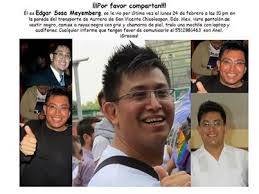On the night of February 24, 2014, after giving workshops on sexuality at the Autonomous University of Chapingo, Edgar Sosa Meyemberg disappeared on the Mexico-Texcoco highway, in the municipality of San Vicente Chicoloapan, State of Mexico after dining with a friend and going down of the same car to take a bus to the Federal District.
A few days later, despite the fact that the public ministries of the State of Mexico were informed that one of Edgar’s cell phones in Iztapalapa had been located by satellite, the authorities asked for silence so that the activist’s life would not be put at risk.
On the night of April 8, authorities in the capital announced that a body found on March 28 in the El Salado area in the Iztapalapa delegation, with signs of torture and traumatic brain injury, was the body of Edgar Sosa.
The same authorities reported that the motive for the crime was unknown. After almost four months of searching, agents of the Attorney General’s Office of the Federal District detained Giovanni Echeveste Morales, accused of taking the life of Édgar.
Edgar Sosa Meyemberg joined the AVE of Mexico when he was 17 years old. He worked as Development Director and had collaborated in other organizations such as IMIFAP (Mexican Institute for Family and Population Research, A.C.) in Yaxiil, Tu Ser, Desarrollo y Integridad, A.C., among many other projects and initiatives. He was a regular guest speaker at public events, and acted as a specialist facilitator in various forums, congresses and national and international trainings. He was 39 years old.
